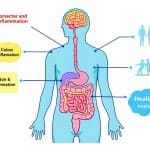Hey there! Struggling with an unruly gut? You’re not alone. For many, issues with gut health can feel like a rollercoaster ride with no end in sight. But don’t worry, we’ve got you covered. Today, we’re diving into Crohn’s disease, a condition that’s often misunderstood but totally manageable with the right approach. We’ll talk about finding that sweet balance–the harmony your gut might just be screaming for.
The Mystery of Crohn’s
So, what exactly is Crohn’s disease? It’s one of those inflammatory bowel diseases (IBD) that affects different parts of your digestive tract. It can be a bit of a jack-of-all-trades, varying wildly from person to person. Sometimes it’s mild; other times, it screams for attention. And hormones? They love to join the party, making everything a tad trickier. Imagine them like that unwanted guest at a meeting – stirring things up because they mess with mood, digestion, even how your immune system reacts. Explains the need for understanding how hormone regulation fits into the Crohn’s puzzle, right?
Now, before we get into how to tackle this beast, remember: each person is unique. What might work wonders for one person can be a total flop for another. That being said, there are some pretty universal strategies to try.
Setting the Stage with Nutrition
Understanding Your Gut’s Needs
First off, let’s talk food. News flash: not all foods play nice with Crohn’s. Some are dubbed as culprits – spicy stuff, greasy fried foods, and sometimes the beloved dairy. Sound familiar? But don’t start banning everything. Instead, make friends with your trigger foods by keeping a food journal. Who knew journaling could be a lifesaver, right? Jot down what you eat and how you feel. Patterns will start emerging, and you’ll get an idea of what your gut IQ is really telling you.
The Role of Hormone Regulation

Balanced hormones can’t solve everything, but they sure help smooth things out. Think of them as the vibe regulators of your body. When they’re on an even keel, digestion can improve, and stress is easier to handle. Start with some small adjustments. Manage stress with enjoyable activities like yoga, meditation, or just deep breathing in a quiet corner. The calm not only feels good but helps regulate hormones.
Fiber: Frenemy or Friend?
Fiber can be your friend or frenemy. During flare-ups, high-fiber foods might irritate your gut. It’s about knowing when to push pause on the kale smoothie. However, during those non-flare days, incorporate soluble fibers—sweet potatoes, oats, or even ripe bananas. Trust me on this, listening to your body here can make all the difference.
Hydration Is Key
Never underestimate the power of hydration. Keeping those insides well-lubricated aids digestion. Want a tip? Make water your mealtime buddy. Drinking water while eating helps. It’s simple yet phenomenal. Avoid those sugary drinks; they hype up inflammation, and that’s just counterproductive.
Essential Crohn’s Support Strategies
Exercise Your Way to Balance
Exercise—while it might sound counterintuitive especially if you’re grappling with fatigue—can be an uplifting ally. It promotes good digestion and can ease any Crohn-induced stress. Just be gentle with yourself. Start small. Think walks around the block or light swimming. No need to hit the marathon circuit; listening to your body’s signals ensures you approach exercise the right way.
The Probiotic Factor
Ever heard of a gut buddy? Probiotics are just that! They work behind the scenes to maintain your gut ecosystem. Add a quality probiotic supplement to your routine or chow down on some yogurt with live cultures. They may help tip the scales towards a more balanced gut flora.

Building Your Crohn’s Toolkit
Equip yourself with stress-busters, travel-friendly snacks, and a killer playlist for relaxation while your medication handles the rest. Cram less “shoulds” into your day. This isn’t about overhauling your routine overnight but layering on bits of change.
Navigating Social Situations
Living with Crohn’s sometimes means anticipating what’s in store when dining out or at gatherings. Make a mental note of potential choices you can safely enjoy. Feel comfortable discussing your condition with friends—it lightens the load considerably when people know what’s going on.
Common Missteps and Adjustments
Artificial Sugar Hazards
Artificial sugars might seem harmless, but boy, they can be sneaky little devils, especially in large amounts. All those sugar-free treats? Caution, folks. They can provoke flare-ups. Moderation is key, and yes, even here, the groundbreaking practice of “listen to your body” applies.
Medication Management
Listen, treating Crohn’s without medication is like trying to drive a car without steering. They’re essential. But, staying consistent with them can turn into a story of skips and catches. Set those alerts, place meds in plain sight, or even tap into pill organizer apps. Anything that ensures adherence.

Hormonal Impacts on Crohn’s
Hormone regulation isn’t just a wellness buzzword. It does tie directly into Crohn’s disease management. Stress and anxiety hormones like cortisol can make symptoms flare more frequently. Women may face added complications during menstruation when hormone levels fluctuate notably. Paying close attention to these cues can offer a deeper understanding of personal symptoms—and knowing your hormonal triggers can preemptively arm you against a wave of discomfort.
Reassessing Your Care Strategy
Living with Crohn’s means periodic assessment and readjustment. Confer with healthcare providers regularly. Keeping a two-way street open with them enriches your treatment approach—makes it a perfect mix of medical intervention and personal insight.
Seeking Help
Sometimes, going it alone feels too draining. In these moments, reaching out to support groups or a therapist with a background in IBD can work wonders. The value of shared experiences meshes well with medical care, and sometimes adds the extra hint of motivation necessary to instigate a lifestyle change.
Pulling It All Together
Finding Crohn’s disease balance might look like untangling a knotted necklace initially confusing and criss-crossy, yet doable. Be patient. Remember that the ability to implement small strategies can reverberate successful long-term results—keep reinforcing hormone regulation, nutrition choices, exercise, and seeking mental health responses for a well-rounded approach.
In the grand tapestry of health management, Crohn’s is a thread. It’s vital yet interwoven. Pick up that needle and embrace weaving with attention and compassion. You’ll find that over time, you’ll go from balancing precariously to dancing gracefully.
Have some thoughts? Feel free to share them! After all, shared stories equal shared strength. We’re all in this together.
Frequently Asked Questions
What causes a hormonal imbalance?
A hormonal imbalance can be caused by natural changes or stages in life, such as puberty, pregnancy, perimenopause, and menopause. Other factors include genetics, aging, increased daily stress, and significant life events like a partial or full hysterectomy[3][5].
What are the signs and symptoms of a hormonal imbalance?
Signs and symptoms of a hormonal imbalance can include irritability and fatigue, mood swings and depression, skin dryness and loss of elasticity, water retention and weight gain, osteoporosis and joint pain, less interest in sex, insomnia, and other sleep disorders, as well as memory issues and difficulty concentrating[3][5].
How can hormone replacement therapy help with hormonal imbalance?
Hormone replacement therapy (HRT) can help by restoring stable hormone levels, leading to improved sleep, increased energy, enhanced memory, better mood stability, smoother and more hydrated skin, increased interest in sex, better weight regulation, and protection against joint and bone issues. HRT can be tailored to individual needs and may include systemic hormone therapy, low-dose vaginal products, or bioidentical hormone replacement[3][5].
What role does diet play in hormone regulation?
Diet plays a significant role in hormone regulation. Consuming clean proteins like nuts, beans, and lentils, lean proteins such as organic pasture-raised chicken and fish, healthy fats like coconut oil, and leafy vegetables rich in antioxidants can help maintain a balanced hormonal system. These foods support the endocrine system and aid in hormonal production[4].
References



